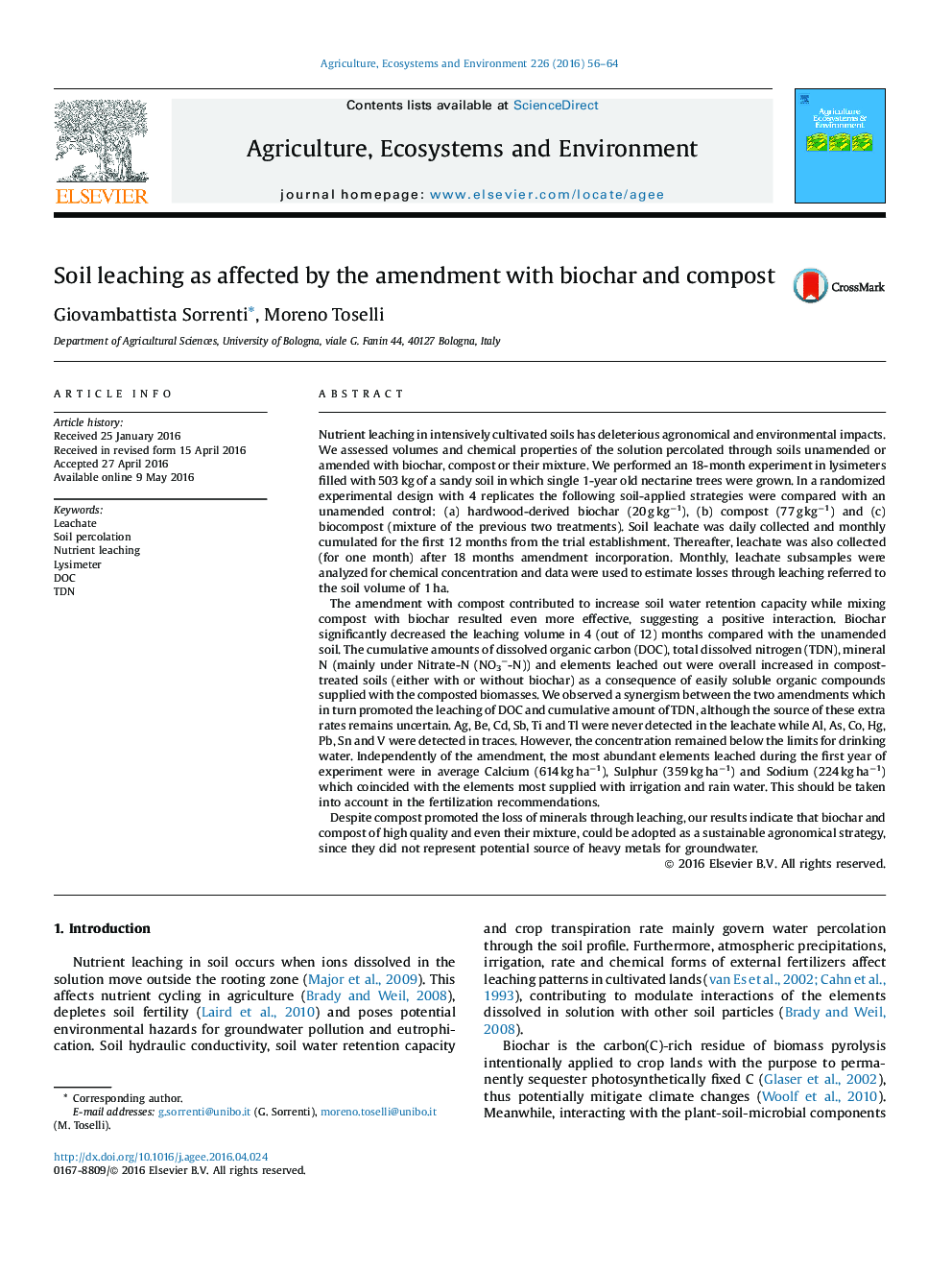| کد مقاله | کد نشریه | سال انتشار | مقاله انگلیسی | نسخه تمام متن |
|---|---|---|---|---|
| 2413514 | 1552026 | 2016 | 9 صفحه PDF | دانلود رایگان |
• Compost increased leached volumes and loss of DOC, TDN and chemical elements.
• Compost and biochar synergistically promoted soil WHC and losses of DOC, TDN, K, P.
• The most abundant elements lost through percolation were Ca, S, Na, K and Mg.
• Compost and biochar did not release heavy metals in the percolated soil solution.
• Significant amounts of elements were supplied by irrigation and rain water.
Nutrient leaching in intensively cultivated soils has deleterious agronomical and environmental impacts. We assessed volumes and chemical properties of the solution percolated through soils unamended or amended with biochar, compost or their mixture. We performed an 18-month experiment in lysimeters filled with 503 kg of a sandy soil in which single 1-year old nectarine trees were grown. In a randomized experimental design with 4 replicates the following soil-applied strategies were compared with an unamended control: (a) hardwood-derived biochar (20 g kg−1), (b) compost (77 g kg−1) and (c) biocompost (mixture of the previous two treatments). Soil leachate was daily collected and monthly cumulated for the first 12 months from the trial establishment. Thereafter, leachate was also collected (for one month) after 18 months amendment incorporation. Monthly, leachate subsamples were analyzed for chemical concentration and data were used to estimate losses through leaching referred to the soil volume of 1 ha.The amendment with compost contributed to increase soil water retention capacity while mixing compost with biochar resulted even more effective, suggesting a positive interaction. Biochar significantly decreased the leaching volume in 4 (out of 12) months compared with the unamended soil. The cumulative amounts of dissolved organic carbon (DOC), total dissolved nitrogen (TDN), mineral N (mainly under Nitrate-N (NO3−-N)) and elements leached out were overall increased in compost-treated soils (either with or without biochar) as a consequence of easily soluble organic compounds supplied with the composted biomasses. We observed a synergism between the two amendments which in turn promoted the leaching of DOC and cumulative amount of TDN, although the source of these extra rates remains uncertain. Ag, Be, Cd, Sb, Ti and Tl were never detected in the leachate while Al, As, Co, Hg, Pb, Sn and V were detected in traces. However, the concentration remained below the limits for drinking water. Independently of the amendment, the most abundant elements leached during the first year of experiment were in average Calcium (614 kg ha−1), Sulphur (359 kg ha−1) and Sodium (224 kg ha−1) which coincided with the elements most supplied with irrigation and rain water. This should be taken into account in the fertilization recommendations.Despite compost promoted the loss of minerals through leaching, our results indicate that biochar and compost of high quality and even their mixture, could be adopted as a sustainable agronomical strategy, since they did not represent potential source of heavy metals for groundwater.
Journal: Agriculture, Ecosystems & Environment - Volume 226, 16 June 2016, Pages 56–64
